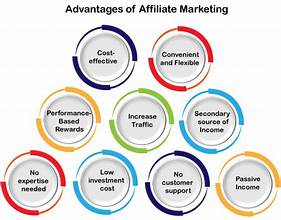Master Affiliate Marketing 2024

Affiliate marketing offers a potent method for earning online income. It allows individuals to earn commissions by promoting products or services offered by other companies. With the right approach and dedication, anyone can master affiliate marketing and build a lucrative business. In this comprehensive guide, we’ll explore everything you need to know about affiliate marketing, from understanding the basics to advanced strategies that can help you succeed.
What is Affiliate Marketing?
Affiliate marketing is a performance-based marketing strategy where businesses reward affiliates (marketers) for driving traffic or sales to their website through the affiliate’s marketing efforts.This approach provides advantages to both the company and the affiliate. The business gets more customers, and the affiliate earns a commission for each sale or lead generated through their referral.
How Does Affiliate Marketing Work?

Affiliate marketing encompasses three key participants: the merchant, the affiliate,, and the customer. Here’s a step-by-step breakdown of how it works:
The Merchant: This is the business or company that offers a product or service. They create an affiliate program and provide affiliates with unique links or codes to track their referrals.
The Affiliate: This is the marketer who promotes the merchant’s products or services. They use various marketing strategies, such as blogging, social media, email marketing, and more, to drive traffic to the merchant’s website using their unique affiliate links.
The Customer: This is the person who clicks on the affiliate’s link and makes a purchase or completes a desired action on the merchant’s website. The affiliate earns a commission for this referral.
Benefits of Affiliate Marketing

Affiliate marketing provides a wide range of advantages for both companies and their affiliates. Here are some key advantages:
For Businesses
Economical: Companies incur expenses solely for tangible outcomes like sales or leads, rendering it an economical marketing approach.
Increased Reach: Affiliates help businesses reach a wider audience by promoting their products or services to their followers and network.
Scalable: Businesses can easily scale their affiliate program by recruiting more affiliates to promote their products.
For Affiliates
Low Risk: Affiliates don’t need to invest in product development or inventory. They can start with minimal upfront costs.
Flexible: Affiliates can choose products or services that align with their interests and expertise.
Passive Income: Once established, affiliate marketing can generate passive income as affiliates continue to earn commissions from their past efforts.
Choosing the Right Affiliate Program

Choosing the appropriate affiliate program is vital for achieving success. Here are some factors to consider:
Product Relevance
Choose offerings that resonate with your specific niche and attract your target audience. Promoting products that align with your interests and expertise will make your marketing efforts more authentic and effective.
Commission Structure
Evaluate the commission structure of different affiliate programs. Look for programs that offer competitive commissions and provide recurring revenue opportunities, such as subscription-based products.
Cookie Duration
Cookie duration refers to the length of time a referral is tracked after a customer clicks on your affiliate link. Longer cookie durations increase your chances of earning a commission, even if the customer doesn’t make an immediate purchase.
Support and Resources
Choose affiliate programs that offer robust support and resources for their affiliates. This can include marketing materials, training, and dedicated affiliate managers to help you succeed.
Creating High-Quality Content
High-quality content is the cornerstone of successful affiliate marketing. Here are some tips for creating content that drives traffic and conversions:
Know Your Audience
Understanding your audience’s needs, interests, and pain points is essential. Conduct research to identify what types of content resonate with them and what products or services they are likely to purchase.
Be Honest and Transparent
Authenticity is key in affiliate marketing. Be honest about the products or services you promote and provide genuine recommendations. Make sure to inform your audience about your affiliate partnerships to establish trust.
Use Multiple Content Formats
Diversify your content to reach a broader audience. Consider using blog posts, videos, social media posts, email newsletters, and more to promote your affiliate products.
Optimize for SEO

Optimizing for search engines (SEO) is crucial for attracting organic traffic to your content. Use relevant keywords, create engaging meta descriptions, and optimize your content for readability and user experience.
Leveraging Social Media
Affiliate marketers can leverage social media platforms as powerful tools. Here are some strategies to leverage social media for your affiliate marketing efforts:
Choose the Right Platforms
Identify the social media channels that your target audience engages with most frequently. Concentrate your efforts on these platforms to enhance your reach and engagement.
Build a Strong Presence
Maintaining a consistent approach is essential for establishing a robust social media presence.. Post regularly, engage with your followers, and share valuable content that aligns with your affiliate marketing goals.
Use Visual Content
Content that includes visuals like images and videos typically performs better on social media platforms. Create eye-catching visuals to promote your affiliate products and capture your audience’s attention.
Engage with Your Audience
Engagement is crucial for building relationships with your audience. Respond to comments, ask questions, and encourage your followers to share their experiences with the products you promote
.
Email Marketing for Affiliates
Email marketing is a highly effective strategy for affiliate marketers. Here’s how to use email marketing to boost your affiliate sales:
Build an Email List
Begin by creating an email list of subscribers who have a keen interest in your niche.. Offer valuable content, such as free guides or exclusive discounts, to encourage people to join your list.
Create Engaging Emails
Create captivating and informative emails that offer valuable content to your subscribers. Include clear calls-to-action (CTAs) that guide your readers to take the desired action, such as clicking on your affiliate links.
Track and Analyze Performance
Evaluate the success of your email campaigns to determine which elements are effective and which ones require enhancement. Utilize analytics tools to monitor metrics such as open rates, click-through rates, and conversions.








